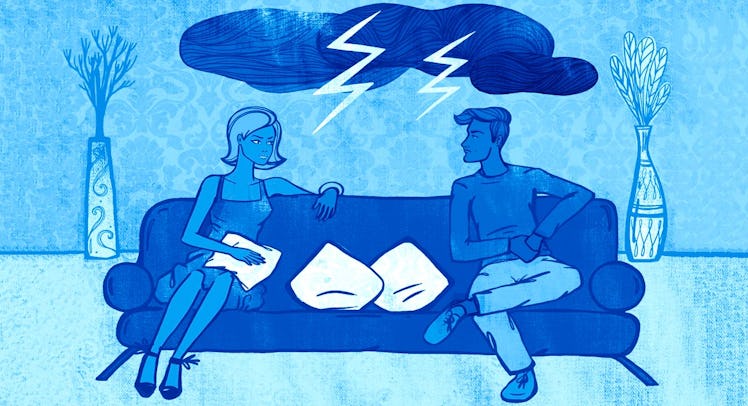How to Become More Self-Aware in Your Marriage
In order to make a partnership work, you have to get to know yourself better.

Anyone who’s been in any long-term relationship knows the feeling of coming home and seeing that the garbage hasn’t been taken out, the sink is piled up with dishes, the floor is littered with a week’s worth of underwear. And, taking the sight in, it’s all that person can do to hold themselves back and not blow up. But the blowing up isn’t the issue. It’s why these things make them want to blow up in the first place. After all, is dirty underwear really something to lose control over? Or does it speak to a larger issue that person might have with their partner?
Experts agree that, when it comes to significant others trying to understand each other better, self-awareness is the key. “One way spouses can become more self-aware is to notice when their emotional reaction to a situation seems out of proportion — and then to ask themselves why,” says Raffi Bilek, a clinical social worker and therapist in Baltimore. “Did you get over-top-angry when your wife came home five minutes late? Did you start crying inconsolably when your husband bought you the wrong color shirt? A disproportionate reaction usually means there’s some deeper issue being triggered by the situation.”
Bilek says that trying to get to the root of the situation is important in beginning to unravel what it is about your partner that triggers you so badly. “Think about whether this situation reminds you of anyone or anything,” he says. “Consider what message you may be telling yourself about what happened, beyond the actual events. These might clue you in to what’s really going on for you.”
Jessi Leader, a couples therapist in Minneapolis, agrees, saying that self-awareness is one of the best gifts one partner can give to the other. “We can understand our identity, character, values, needs, desires, and beliefs by looking at our caregivers and family of origin,” she says. “We learn how to be in relationships from the modeling caregivers provided, as well as the many systems we are part of.”
However, the journey to building self-awareness is not always easy and can involve digging deep into one’s past and unearthing some potentially troubling truths. “The following questions will contribute to self-exploration and knowledge,” says Leader. “How did my family show love, safety, and respect? How did my family express anger, conflict, feelings of being overwhelmed, frustration and rage? How did my family communicate with each other inside and outside of the house? How did my parents or caregivers model gender and spousal roles? How did my family react to hurt, loss, and trauma?”
Michael Burke, the CEO of Quest2 Consulting, a Maryland-based consulting firm that helps people grow through emotional-intelligence training, says self-awareness needs to be worked on regularly, if not daily.
As he points out, couples must continually earn and re-earn what he calls the “AAA card.” The first “A” stands for “Attention” and means that couples must put down the phones, switch off the laptop, and make eye contact when they communicate. “Pay attention with your ears, eyes, and heart,” Burke says. “This will go a long way in checking-in with how you feel, and you might even learn something about your significant other.”
The second “A” in Burke’s “AAA card” is for “Affection,” and is fairly self-explanatory. Simple gestures, whether a kiss on the cheek before leaving for work, or a sweet note left on the kitchen table can go a long way. “There are so many ways of showing affection for your significant other,” says Burke, “and these can — and should — happen throughout the day across multiple channels: a call, text, email, face-to-face. This allows the other person to feel seen, heard, and known.” Equally as important, this, per Burke, also prompts you to think about how you show up in the world and what affection means to you.
The final “A” is “Acknowledgment,” and is Burke’s personal favorite. He says that, in a marriage, the everyday things that spouses do for each other can sometimes be taken for granted and that the love one partner shows for the other becomes normalized and just a part of the daily routine. “Taking the time to pause, acknowledge their efforts, and then validate their love lets them know you ‘see’ what they do and really appreciate it,” Burke says. “Anytime we tell another person, ‘Thank you for putting aside yourself to do this for me!’, we deepen the relationship and create intimacy.”
This type of intimacy doesn’t come easy, Burke cautions. “It has to be earned through self-awareness, being present, and paying attention to the little things happening in a relationship.”
For Leader, the hard work that goes into discovering your own self-awareness, as well as getting down to the roots of why you react the way you do, can be akin to finding a blueprint of your identity and has the potential to be incredibly liberating. “You now have the privilege to relinquish patterns that no longer serve a purpose for your lifestyle, relationships, and marriage,” she says. “You get to decide what contributes to health and what is harmful to the connection. After taking the inventory, couples will then negotiate what patterns and values align with their goals in their partnership. The practice is in relinquishing past behaviors and embracing health and happiness.”